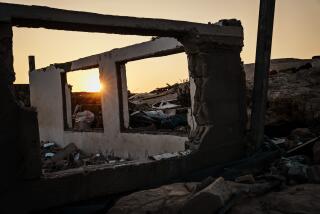In Jerusalem, activist hopes to restore Gypsy pride
- Share via
JERUSALEM — Growing up poor and motherless in the slums of Jerusalem’s Old City, Amoun Sleem dropped out of school at age 7 after her teacher repeatedly singled her out as a Gypsy, inspecting her hair for lice in front of the class and calling her “Nawar,” a derogatory Arabic term that means “dirty.”
On the streets, she learned English by selling postcards to tourists, but soon realized that a life of begging was not for her. At 9, she reentered school and stayed until she got a degree in business administration from Ibrahimi College in Jerusalem.
Now Sleem runs the Domari Society of Gypsies in Jerusalem, a community learning and advocacy center created to preserve the culture of the Dom people, believed to be a branch of the Roma ethnic group — though she prefers the term Gypsies. She hopes to instill pride in today’s youths, who are facing the same poverty and discrimination she did.
As many of Jerusalem’s approximately 1,000 Gypsies seek to assimilate into Palestinian society because they’ve been made to feel ashamed of their roots, Sleem’s center offers classes in the dying language of Domari, cookbooks of Gypsy recipes, lessons in traditional crafts and after-school tutoring to address the community’s dropout rate, which she said is still 30%.
Sleem, who is publishing her autobiography later this year, spoke to the Los Angeles Times about how to end her community’s cycle of poverty without losing its identity in the Holy Land, where Gypsies have lived for centuries.
It seems one of the biggest challenges to Gypsy culture in Jerusalem is the shame and self-loathing some Gypsies feel. What happened to Gypsy pride?
A lot of us gave up on our culture because we didn’t want people to point or laugh at us. We face discrimination from both Israelis and Palestinians. So in order to fit in, some are ashamed to even speak our language in the streets. Traditionally, Gypsy women love colorful clothing, but now they dress like other Palestinians so they don’t stand out. As we mix in with Palestinians, we are losing our identity.
Much of the problem is with ourselves. People look at us as if we are lower. They think we are lazy or beggars. They don’t want their children to marry us. It makes us feel that we are not acceptable. And because we don’t see any other reality, we start to believe it too.
How do you combat those negatives attitudes, especially when they are instilled at such a young age?
It’s very hard to correct. Children learn to be ashamed because of the discrimination they face in schools and in the streets. We provide emotional support and after-school tutoring. We teach them to be proud to be Gypsy. [Recently] some of the girls came into the center to show us their exams and they all got high scores. They were so proud.
The best way is to try to grow inside them a strong belief in themselves. We see some progress. Sometimes I tease them when they are bad and call them “Nawar,” and they say back, “No! We are the Dom people.”
Gypsies and Jews were both persecuted in the Holocaust. Has that created a bond between the groups?
Most Israelis see us as Palestinians, but sometimes they might respect you a little more than Arabs, probably because this history brings us together. The Jewish people had many of the same problems. No one wanted them in their countries.
But that doesn’t turn into help for us. There’s not much attention paid to us from the Jewish side. We’d like the government to recognize us as an official minority. We hope that would allow us to get money and support for our culture.
Some of the harshest treatment seems to come from Palestinians.
I connect it to the occupation. They feel they are discriminated against by the Jews, so they look for someone else to discriminate against.
But to be honest, our community is not easy. We don’t prove [our worth by making] good livings. You don’t see a lot of Gypsy businessmen. There is still a problem with beggars. It’s become a bad habit for us. This is the only community center we have.
As an outspoken community leader and a woman, are you seen as a role model?
No, there is still a mentality about women. People think I’m trying to wear the pants or trying to be a man. Being single makes it even worse. Many in our society don’t support or believe in women. Yet a lot of the burden is on women, who are expected to beg, raise the children and take care of the house while men sleep and drink coffee. But now you’re starting to see more divorce in the community. Women are saying this is not OK anymore.
Which parts of Gypsy culture are most at risk?
The language could disappear here in 20 years. Only older people speak it, though it’s more common in Gypsy communities in Gaza Strip and Jordan.
I’m also trying to bring back items like pillows, jewelry-making, big earrings and colorful dresses. We are losing some of our traditions during funerals and weddings, when there is lots of cooking for the entire community over several days and [women decorate their hands with] henna.
Gypsy women are even cutting their hair and coloring it to make it lighter. They think long, black hair is a sign that you are a Gypsy. I even thought about it once, but my father told me, “If you change your hair, you are not my daughter.”
When some people think of Gypsies, they think of singing, dancing, fortunetelling. Is that part of the culture or a stereotype?
Many people say that’s part of the culture, but I think it was mostly just a way to make money, particularly in Europe. People thought Gypsies could read minds and Gypsies saw it as an opportunity to make a job out of it.
Your center uses the word “Gypsy,” but isn’t “Romani” the politically correct term?
I will always use “Gypsy.” I love the name. It’s romantic and has more meaning than “Romani.” Some in our community wanted to change the name because they weren’t happy with it. But that’s their problem. One day I hope people will find it acceptable and say it with pride.
More to Read
Sign up for Essential California
The most important California stories and recommendations in your inbox every morning.
You may occasionally receive promotional content from the Los Angeles Times.










